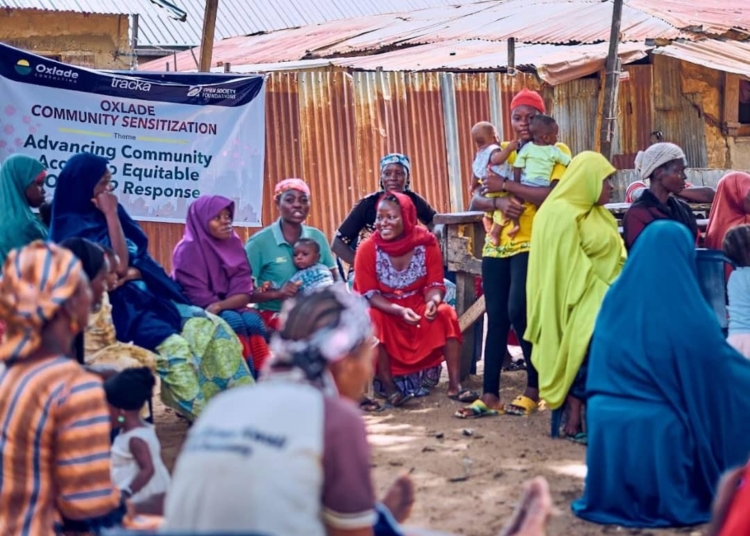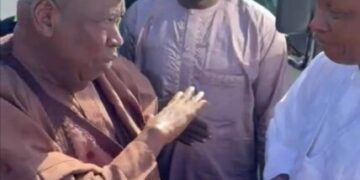Mrs Folake Animashaun was managing her life and supporting her family until she lost her job as a cleaner with one of the branches of Union Bank in Lagos in March 2020.
Life took a turn for the mother of three who was earning N40,000 as a cleaner.
Basically, expenses grew and she ran out of her savings.
The struggle for a daily livelihood was compounded with the outbreak of Covid-19 which led to the Federal Government declaring a lockdown for several months.
According to the mother of three, life feeding the family was tough, especially without a husband.
After managing to provide food for the family in the morning, at night the family “soaked” two handfuls of garri before going to bed.
She further revealed that she usually left the soaked garri for some minutes to swell before she shared it with the family.
But life is beginning to pick up for her again after the pandemic. With the help of some family members and few friends, she was able to raise a small amount of money to start a food business which she says has been sustaining her family.
She hopes that the government would assist her with a Small Medium Enterprises (SME) loan to further boost her business.
The story was not different for Mr Segun Shola Joseph, a resident of the Oke-Igbodo community in Ikorodu East LGA, Lagos State whose weldering business was crippled by the outbreak of the pandemic.
The wife, Mrs Yinka Joseph, was is a food vendor was also affected.
The arrival of the COVID-19 crumbled the husband’s business and he was no longer able to support the family needs.
The wife’s foodstuff business was also placed on hold due to the lockdown and feeding became a big issue for the family.
She was left with no choice but to support her family’s feeding with the food items left in her shop.
After the lockdown was lifted, Mrs Yinka resorted to working in a pure water factory where she was earning N12,000 monthly, a wage that was barely enough to support her family’s needs.
She said she has been saving part of the money in order to raise the capital to start her food items business again.
Mr Joseph said his welding business is still not promising and he hopes he will be able to bounce back to normalcy soon. Emeka Udeze in Ketu, who runs a grocery store said he had to close his shop due to the lockdown which affected his business.
His words: “The only way for me was to obtain a loan from a microfinance bank to restock his store and keep being in business to meet up with customers demand after the pandemic.”
In Abuja, Nigeria’s capital city, businesses took a hit as a result of restrictions on movement imposed by the Federal Government.
Mrs Aisha Audu, who runs an online thrift store, said she was unable to sell anything during the pandemic.
She told the Tracka team – a Non-governmental organization – that she lost most of her customers during the lockdown.
Tracka’s mandate together with another NGO, Oxlade, was to monitor the distribution of the Nigerian government’s palliatives to vulnerable citizens.
In 2021, the Nigerian Ministry of Industry, Trade and Investment, Mariam Katagum, had said the MSME Survival Fund Scheme meant to cushion the effect of COVID-19 on businesses.
There were five tracks under the Nigeria Economic Sustainability Plan (NESP) approved by the Federal Executive Council (FEC) in July 2020.
They are: Payroll Support Scheme, Artisan and Transport Scheme, Formalisation Support Scheme, General MSME Grants and Guaranteed Off-take Scheme.
The government had said it had so far disbursed N56,842,780,000.00 to 1,079,323 persons excluding the Guaranteed Off-take Scheme but a lot of people could not partake.
The government had noted that for the Payroll Support Scheme, only 459,334 had benefitted out of the initial target of 500,000 beneficiaries across the 36 States and the FCT.
On the Artisan and Transport Scheme, the initial target was 333,000 Artisan and Transport beneficiaries but only 293,336 partook across the 36 States and the FCT.
Speaking further with Tracka, the woman, Audu said, “Who thinks about buying clothes during the Covid period when everyone is locked inside their various houses?”
Aisha’s brother, Mustapha, who is a dispatch rider was also badly affected by the lockdown.
Mustapha’s business was on hold for the period the lockdown lasted.
Another resident, Maryam Mohammed lamented the huge impact of the pandemic as she disclosed that her beauty salon suffered a major setback.
According to her, most of her loyal customers resorted to cutting their hair and wearing wigs as against plaiting/braiding it in her shop.
“One big madam that used to tip me very well stopped coming to my shop during the Covid-19 pandemic. The woman went on low cut and that was how I lost her as a customer. I was no longer getting big money from her,” she said.
“One big madam that used to tip me very well stopped coming to my shop during the Covid-19 pandemic. The woman went on low cut and that was how I lost her as a customer. I was no longer getting big money from her,” she said.
Speaking with our correspondent, the Program and Project Manager for Tracka, Mercy Danjuma said data from BudgIT, an NGO that monitors and tracks government spending, showed that Nigeria received N70,801,753,660 in donations.
She said: “Local and international organisations contributed to helping Nigeria fight the pandemic, but our investigation showed that these funds didn’t get to Many Nigerians. Some of the citizens who we spoke with told us that they have not seen how the government used these funds.
“Unfortunately, these funds were not properly disbursed, as our findings revealed that citizens were shortchanged by the key actors managing the funds. Money meant for the public was diverted for personal use, leaving citizens stranded after losing their means of livelihood.”





